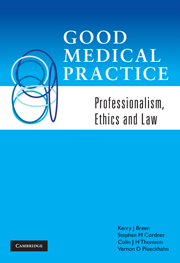Book contents
- Frontmatter
- Foreword
- Contents
- List of tables
- Preface
- Preface to the 1997 edition
- Acknowledgments
- About the authors
- Table of cases
- Table of statutes
- 1 Ethical principles for the medical profession
- 2 Ethical and legal responsibilities of medical students
- 3 Communication skills
- 4 Consent and informed decision making
- 5 Confidentiality, privacy and disclosure
- 6 Medical records, reports and certificates
- 7 Negligence, professional liability and adverse events
- 8 The regulation of the medical profession
- 9 Health care complaints systems
- 10 The doctor and sexual boundaries
- 11 Personal health of the doctor: illness and impairment
- 12 Maintenance of professional competence
- 13 Ethics and the allocation of health-care resources
- 14 The Australian health-care system
- 15 The doctor and interprofessional relationships
- 16 Entering and leaving practice and practice management
- 17 Clinical research
- 18 Prescribing and administering drugs
- 19 Diagnosing and certifying death and the role of the coroner
- 20 Births, reproductive technology, family law and child protection
- 21 Termination of pregnancy and related issues
- 22 Withholding or withdrawing treatment in the seriously or terminally ill
- 23 The law and the mentally ill
- 24 The law and courts of law in Australia
- 25 Medico-legal examinations and reports, court procedures and expert evidence
- 26 Other legislation relevant to medical practice
- APPENDIX 1 AMA CODE OF ETHICS – 2004
- Index
- References
25 - Medico-legal examinations and reports, court procedures and expert evidence
- Frontmatter
- Foreword
- Contents
- List of tables
- Preface
- Preface to the 1997 edition
- Acknowledgments
- About the authors
- Table of cases
- Table of statutes
- 1 Ethical principles for the medical profession
- 2 Ethical and legal responsibilities of medical students
- 3 Communication skills
- 4 Consent and informed decision making
- 5 Confidentiality, privacy and disclosure
- 6 Medical records, reports and certificates
- 7 Negligence, professional liability and adverse events
- 8 The regulation of the medical profession
- 9 Health care complaints systems
- 10 The doctor and sexual boundaries
- 11 Personal health of the doctor: illness and impairment
- 12 Maintenance of professional competence
- 13 Ethics and the allocation of health-care resources
- 14 The Australian health-care system
- 15 The doctor and interprofessional relationships
- 16 Entering and leaving practice and practice management
- 17 Clinical research
- 18 Prescribing and administering drugs
- 19 Diagnosing and certifying death and the role of the coroner
- 20 Births, reproductive technology, family law and child protection
- 21 Termination of pregnancy and related issues
- 22 Withholding or withdrawing treatment in the seriously or terminally ill
- 23 The law and the mentally ill
- 24 The law and courts of law in Australia
- 25 Medico-legal examinations and reports, court procedures and expert evidence
- 26 Other legislation relevant to medical practice
- APPENDIX 1 AMA CODE OF ETHICS – 2004
- Index
- References
Summary
This chapter is designed to assist doctors in conducting medico-legal examinations and preparing medico-legal reports, and to advise doctors about appearing in court as ordinary or as expert witnesses. Problems that may arise at medico-legal examinations are first identified and advice is provided about the content and scope of medico-legal reports. After briefly describing the adversarial system used in Australian courts, the chapter is then structured around the usual sequence by which a doctor becomes aware that he or she may be required in court. Lastly, the matter of jury duty for doctors is touched upon.
MEDICO-LEGAL REPORTS
Treating doctors' reports
For doctors who are primarily in clinical practice, the most common involvement with the legal system will come via a request for a medico-legal report about a current or past patient, most often in the context of an insurance or workers compensation claim. The request should be accompanied by an original signed authority from the patient to release the medical information and by a letter from the solicitor describing what is requested.
In preparing medico-legal reports in regard to the diagnosis, care and treatment of a patient, doctors should take care to answer the questions asked of them and should strive to make the report factual, objective, complete and to the point. Material in the patient's records that is irrelevant to the request should not be included in the report.
- Type
- Chapter
- Information
- Good Medical PracticeProfessionalism, Ethics and Law, pp. 367 - 385Publisher: Cambridge University PressPrint publication year: 2010



